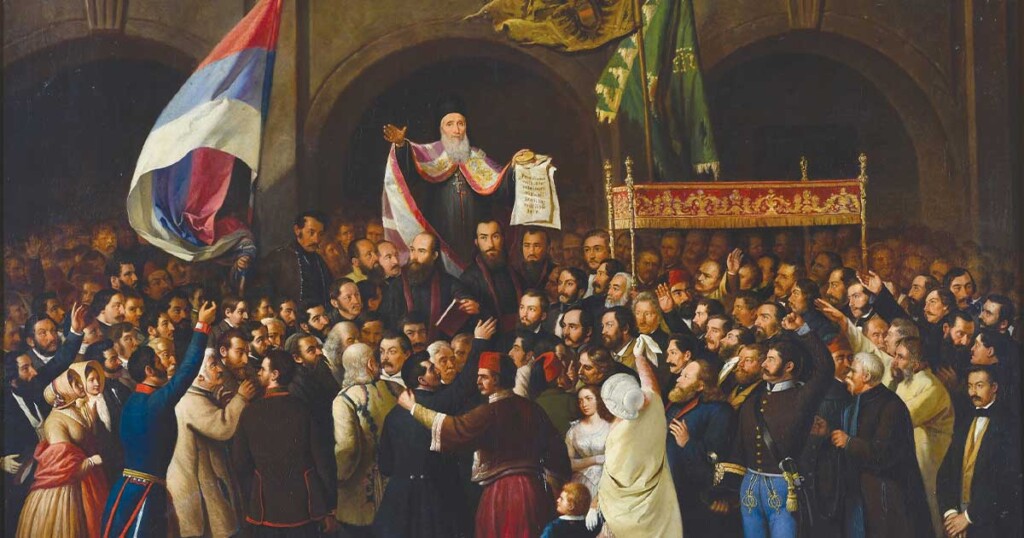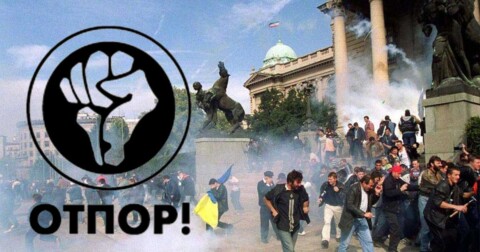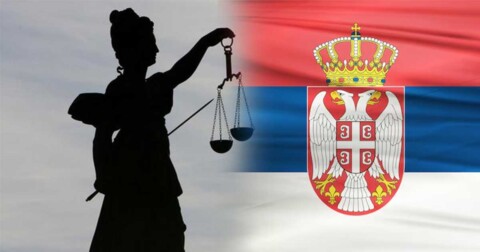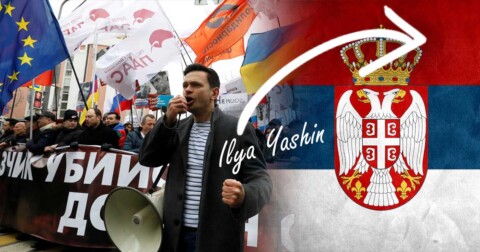In global terms, the Serbs are a relatively small people, living in a modestly sized territory and possessing limited economic, military, and other power, yet they act disproportionately to this, as though they were much stronger—almost like a great power. This is not merely a paraphrase of the observation made by the distinguished Russian scholar Konstantin Nikiforov. Many other foreign researchers, especially in the fields of historiography, anthropogeography, ethnopsychology, Slavic studies, and Balkan studies, have reached similar conclusions. Experts in international relations, diplomacy, intelligence and security, geopolitics, and geostrategy are likewise ready to claim that the Serbs have an imperial spirit.
Clearly, there is truth to this, but why is it so? How is it that the Serbs instinctively recognize and respond to pivotal historical challenges in the manner of so-called great imperial nations? Is this not an archetypal phenomenon? Does it stem from an awareness of past greatness in earlier historical epochs? From the delicate fate of being the westernmost branch of Orthodox civilization? From the imperial Nemanjić legacy? From the constant struggle for freedom and the experience of suffering? From their position on the Balkan “windswept crossroads” and “powder keg”? Or perhaps from the fact that, after all, “from Vienna to Constantinople there is no greater people than ours” (Cvijić)?
DILEMMAS AT HISTORICAL CROSSROADS
There is, however, an entire school of thought, with several branches, which argues that the Serbs, in crucial historical moments, nevertheless made wrong decisions and paid a high price for them, and that from the standpoint of far-reaching interests and consequences they should have acted differently.
- For example, when Stefan the First-Crowned received his crown from the Pope in 1217, should his brother Sava have remained on the same line, instead of seeking and obtaining ecclesiastical independence in Nicaea in 1219, thereby permanently binding the overwhelming majority of Serbs to the Orthodox world, to the East rather than the West?
- Or, when in 1389 Prince Lazar confronted the Ottoman “horde” and, by choosing the “Heavenly Kingdom,” permanently marked the Serbs with the “Kosovo Covenant,” would it not have been more pragmatic to “negotiate” with Sultan Murad, instead of his “Pyrrhic victory” which in reality meant long-lasting slavery for the Serbs?
- By rejecting the Florentine Union in 1439 — something the Latin Church has not and never will forget or forgive — did the Serbs in that pivotal moment not determine, in the long run, not only their own future but also that of Europe and Christianity as a whole?
- Instead of embarking on the Great Migration of 1690, thereby “opening the space” in Old Serbia for massive Albanian settlement, would it have been a better decision for the Serbs to remain, retreat into local refuges, endure Ottoman oppression for a while, and preserve the cradle of Serbian identity, at the same time safeguarding the “geopolitical macro-fortress of the Balkans”?
- When launching the First Serbian Uprising, was the geopolitical timing adequate, or should they have waited for an even deeper crisis of the “Sick Man of the Bosporus”? And in launching the Second Uprising, would liberation have been faster and more complete if it had been placed in the context of a pan-Balkan movement against the Ottoman occupier?
- When the dynastic change of 1903 occurred, replacing the Obrenović dynasty, who had, willingly or not, maintained a pro-German orientation, with the Karađorđević dynasty, who were more or less aligned with the Anglo-French side, can one overlook the fact that this also meant a reorientation of the Serbs away from their geopolitically inherent tellurocratic identity and toward an unsuitable thalassocratic habitus?
- Given that in 1915 the Serbs were offered — albeit as a collateral outcome — the creation of a greatly enlarged, national, so-called “Greater Serbia,” which would have included not all, but most Serbian lands, was it not a cardinal mistake to reject this option in favor of creating a multinational Yugoslav state in 1918 — one that would prove very costly for the Serbian people?
- With the coup of March 27, 1941, and the rejection of accession to the Tripartite Pact, the Serbs indeed acted bravely and freedom-loving, but does it not remain a question whether they could have acted more wisely — avoiding the provocation of Nazi vengeance and the great sacrifices that followed?
- By reluctantly, but ultimately accepting the “break-up” of the SFRY along Titoist republican borders rather than along approximate boundaries of the constituent peoples, did the Serbs not, at that historical–geopolitical crossroads, take the wrong path with immeasurable negative consequences?
- And the key question: by the official policy’s choice of integration into organizations of a foreign, Western civilization — primarily the hostile EU, which (in)directly also means into the even more hostile NATO — and against the will of the overwhelming majority of Serbs, is Serbia thus stepping onto an obvious wrong path, committing a long-term, irreparable mistake?

THE NECESSITY OF NATIONAL PATIENCE AND ENDURANCE
These are only some of the key dilemmas, but there are many more. And it is not a matter of empty “what if” speculation, but of strategic national choices. At the same time, the Serbs are partly justified by the fact that they could decide very little about their own destiny, since it was mostly the great powers who made the decisions in line with their own interests in the geopolitically crucial Balkans — that “precise seismograph” of global geopolitical tremors. Thus, the slogan “The Balkans to the Balkan peoples” may sound nice and appealing, but it is utopian. It would be more accurate to say that “The Balkans are too important to be left (only) to the Balkan peoples.”
The Serbian writer Milovan Danojlić once perceptively remarked: “You cannot defend yourself from force with logic or truth. Set up an ambush and wait, a century or two, until the opportunity comes.” To this, only two existentially important things could be added:
- First, that the Serbs, given their position, must meticulously and continuously — even on a daily basis — monitor global and regional geopolitical trends in order to recognize the moment when the opportunity “comes” and to react adequately, in line with their national interests.
- Second, that the Serbs should not wait passively for a favorable geopolitical constellation, hoping that some great power will do the job for them, but should actively, both internally and externally, “prepare the ground” for decisive action when the time comes — making sure not to repeat mistakes in the decisive moment.
The most favorable general geopolitical and geostrategic conditions for achieving the key national goals — which are essentially two: liberation from foreign domination and the unification of most of the Serbian people and lands into an integral national state — do not appear often. Perhaps only a few times in national history. And they usually come after major wars of global, continental, or regional scope, when new spheres of interest are established, major political-territorial changes take place, and borders are redefined.
Of course, a necessary precondition is that the Serbs are on the victorious side, and that with the victorious powers they share a compatible civilizational–geopolitical identity and build a long-term symbiosis of interests — in other words, that they “recommend themselves” so that the “small Serbian boat can be tied to their large ship.” Such opportunities must not be missed, nor should one act with short-sightedness, irresponsibility, or without weighing the negative consequences of combinations like the creation of the Yugoslav state in 1918.
It should also not be forgotten that it is no less important, during the negative swings of the historical pendulum — as in the 1990s, when Serbian rivals grew stronger and united — to pass through such periods with minimal losses.

BEING ON THE RIGHT SIDE OF THE FUTURE
What do current geopolitical trends indicate? And does the coming period bring a more favorable constellation for resolving the Serbian question, how can the critical moment be recognized, and what should be done in that regard?
Unipolarity as a system, globalization as its “ideological fabric,” and U.S. hegemony at the head of the “collective West” — all of which have proven to be strongly anti-Serbian — are clearly fading from the scene. Indicative is the American (Trumpist) message that they “will not interfere” in internal Balkan affairs, which is incomparably more favorable than the previous stance that they “have unfinished business in the Balkans.” Still, it must be approached with great caution — and even greater caution must be exercised toward the destructive actions of a “wounded EU,” especially Germany, Austria, and formerly a member, Great Britain.
In contrast, multipolarization as a recent process, re-sovereignization as a “return to normality,” and the strengthening of China, Russia, India, and several other “geostrategic players” (Brzezinski) are rapidly leading to a fundamental restructuring of the world and creating the preconditions for a Serbian national renaissance. The adequate momentum will come from the global geopolitical result:
- On one side, when U.S. influence is reduced mainly to the Pan-American zone, i.e., the Western Hemisphere, and when centrifugal forces within the EU lead to its implosion or essential transformation into a “Europe of Nations.”
- On the other, when, after the end of the conflict in the Ukrainian arena, Eurasian powers structure the “mega-continent” into spheres of interest so that most of the Balkans is included in the “(Pro-)Russian Greater Space.”
In this context, the Serbs should not “sit with folded hands” but should “do what is within their power.”
Domestically, Serbia should establish national integrity in all fields where possible (economic, educational, scientific, cultural…), and in such a state of readiness await the opportunity for political-territorial unification. For Serbia’s “Piedmont role” to be fully realized, it is necessary to remove residual but still powerful destructive elements of Yugoslavism and, following the example of Republika Srpska, transform Serbia into a genuine national state.
In the field of international relations, it is necessary first step by step, and then definitively, to abandon the “European path” — which, truth be told, should never have been taken. In other words, the (nominally) Serbian political nomenclature and a large part of the economic and intellectual elite must be stripped of the usurped right to impose on the nation a disoriented, schizophrenic position, leading it toward an unsuitable civilizational and geopolitical bloc of a declining, decadent, and demonstrably anti-Serbian West.
The Serbs and Serbian lands have always belonged — and especially now belong — to the dynamic, traditionalist East, above all to the Orthodox and tellurocratic world that is identical to their own identity. The Serbian people and the future unified national state belong geopolitically to the Balkans, and the Balkans do not have Euro-Atlantic, but rather “Eurasian characteristics,” as Cvijić would say.





